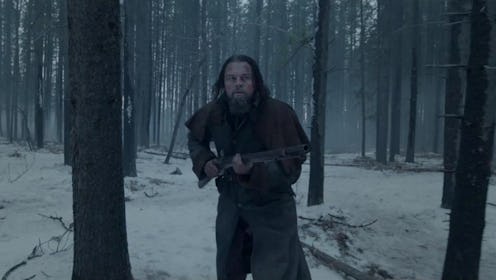Entertainment
The Golden Globes Are All About White Men Fighting

I watched the Sunday night Golden Globes in grim astonishment as my favorites, time after time, were struck down, snubbed in favor of some other film. Mad Max: Fury Road? Lost to The Revenant — twice. Spotlight? Same fate. Carol and Room (except a hard-earned win for Best Actress for Brie Larson) also went the same way, losing out in their categories to movies that featured older white men battling it out on screen. That seemed to be the overwhelming trend of the 2016 Golden Globes — comebacks and prizes for the likes of Ennio Morricone, Sylvester Stallone, and Aaron Sorkin, and throwbacks to old Hollywood westerns (The Hateful Eight and The Revenant both, in their ways, pay homage to the genre).
As T Magazine hashtagged it, #3satrend — and at least that many awards honored gritty, bloody films focused on white men. It's darkly humorous that, on a night that opened with Kate Winslet's acceptance speech about how far women have come this year, the night ended up snubbing the large majority of the movies that highlight that progress. As much as conversations about gender in Hollywood and the pay gap penetrated many spheres of filmmaking, it still feels hollow when white men battling it out on screen and in their categories cause the majority of upsets at a major awards show.
It began when Ennio Morricone won the Golden Globe for Best Original Score for Quentin Tarantino's eighth film, the three-hour epic The Hateful Eight. Tarantino's acceptance speech on Morricone's behalf explained that the 87-year-old composer was not only his favorite composer (among old masters like Schubert, Beethoven, Mozart), but that among all the scores he's composed, he had never won an award. (It turns out, that's not quite accurate — Morricone has never won an Oscar, but he had previously won two Golden Globes.) Morricone scored many of the old masterpieces of vintage westerns, which is why Tarantino recruited him for The Hateful Eight. But, Tarantino's appearance on stage also indicated that this was a win not just for the man, but for the film as an entirety, which is a grotesquely violent work that delights in the havoc it wreaks. Win one for the white male fighter.
Then there's Sylvester Stallone — more than 40 years after his first appearance as Rocky in the eponymous film, Stallone has won a Golden Globe for his reprisal of Rocky in Creed. It's another bloody, violent role in which Stallone plays the mentor to his younger co-star Michael B. Jordan. Yet Creed's star Jordan was not included among the Best Actor nominees and Stallone beat out more important, enduring performances like Idris Elba in Beasts of No Nation.
At the end of the night, Alejandro G. Iñárritu's The Revenant took home three awards, though it was only the frontrunner for one (Leonardo DiCaprio for Best Actor, Drama). Though The Revenant does treat many of its First Nations characters as real, multi-dimensional characters (and DiCaprio was certain to mention the challenges facing indigenous communities menaced by corporate interests in his acceptance speech), the majority of the film's narrative is consumed by a revenge quest of one white man against another that culminates in a surrealistically violent face-off on a frozen riverbank.
Fight scenes, white men, old Hollywood — none of these are inherently insidious, but at the end of the Golden Globes there was a distinctive leaning towards honoring all of them in combination, eschewing more progressive nominees in favor of themes Hollywood has already thoroughly trodden. Discussions about the role of women in the film industry dominated Hollywood for much of the year, and successful, critically acclaimed films like Carol, Room, and Brooklyn fostered the sentiment that perhaps the tides were shifting. But, at the end of Sunday night, beyond the categories devoted to female performances, the general categories were not only generally skewed in favor of men, but of white men fighting. Maybe it's a proximal last-gasp fight for control over the industry, or maybe it's a sign that despite all the talk, actions have yet to bear out that conversation. In any case, it's thoroughly disappointing.
Image: 20th Century Fox